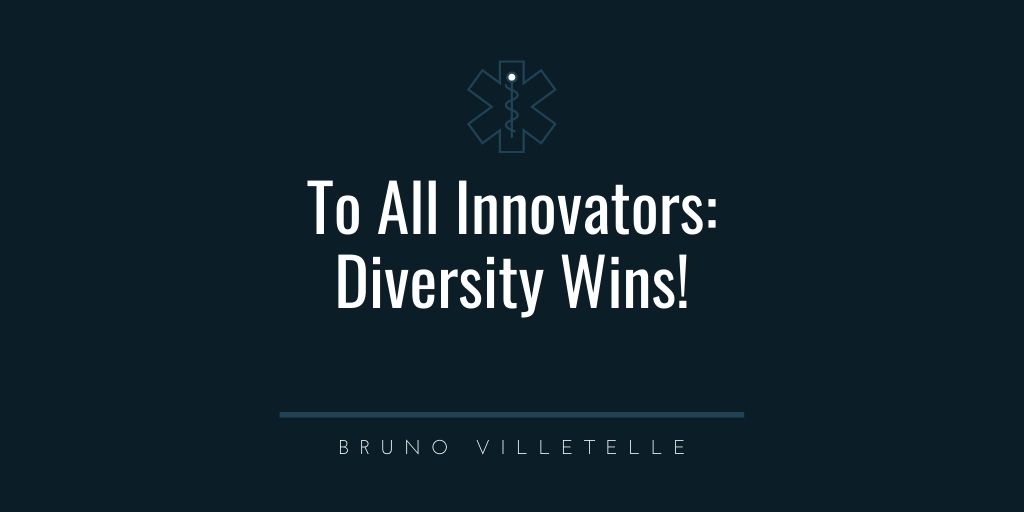This article was originally published on Bruno’s LinkedIn.
It is widely believed that diversity is essential to innovation, and for good reason. Studies have found that companies with diverse leadership teams are 36% more likely to be profitable and generate 19% higher innovation revenue. Diversity is generally defined as the condition of having or being composed of differing elements or qualities. This being the definition, we are all diverse, so ensuring integrity and equity is of utmost importance considering that people can only be their best if they are able to express themselves freely without any concerns about their race, culture, gender identity, or sexual orientation. Ensuring integrity and equity is a fundamental part of being a leader.
Further developing my ability to be an inclusive leader has been full of self-growth and learning. I developed three strong beliefs on why diversity, inclusion, and equity are not only a human right responsibility, they are also critical to being a successful leader, and in business. Lessons of three decades driving innovation as an aspiring inclusive leader:
Integrate Diverse Perspectives
It sounds obvious but it starts with considering diverse point of views and needs of others, and learning how to tactfully navigate conflict situations. Composing diverse teams is critical to achieve collective success across differences yet it is just a starting point. Offering a diverse team an equitable and safe environment to express themselves freely is essential. The lines between private and work life are blurred, now more than ever, and we should expect people to bring their true self to the team. When we can share who we are, in the spirit of inclusivity and understand, empathize, and learn from one another, then we can generate new ideas, truly collaborate, drive innovation, better understand our stakeholders and better serve patients. Diversity and inclusion have been the topic across the globe for years now. Yet, the sad reality is those from underrepresented groups are still not treated equitably and often feel they do not have a voice. I am committed to be the epitome and voice of genuine leadership and engagement, which has led me to become one of Novartis’ diversity champions.
Build Interpersonal Trust
Another critical element to ensuring diversity and inclusion is the ability to establish rapport by finding common ground while simultaneously valuing perspectives that differ from my own. We can expect people to fully focus on and provide maximum contribution only if they do not spend their time and energy to censor themselves at work. The effort required to keep their true selves hidden can lead to isolation and feeling isolated at work has negative effects on both the lonely individual and the wider organization. When each of us can bring our authentic selves to work, we are more productive, engaged and happy. Novartis recently organized a Global Pride Webcast and we had the opportunity to hear from Gareth Thomas, international rugby legend to talk about his coming out publicly while still playing. He was then asked, if this would compromise his performance in the athletic field. Gareth responded, “My performance can only get better. I can run faster, jump higher as I do not have to carry that heavy load on my shoulders anymore”. His words resonated deeply.
Have an impact
In the end, embracing diversity is about turning good intentions into concrete results. It calls for the willingness to confront difficult topics and invest in bringing people of all backgrounds along to achieve meaningful results. In the innovative medicines space, we can best serve society and reimagine medicine for our global patient population only if we build a workplace that represents our global patient population. A ProPublica analysis reported that “black people and Native Americans are under-represented in clinical trials of new drugs, even when the treatment is aimed at a type of cancer that disproportionately affects them.” It is critical that innovative therapies include an understanding of impact across a diversity of patient populations, including under-served communities who could greatly benefit from these treatments. Novartis is committed to increase patient diversity in drug development; the most meaningful impact can be done by diverse people for diverse people.
I am proud to be working at the first global pharmaceutical company to uphold the United Nations Standards of Conduct for Business, tackling discrimination against Lesbian, Gay, Bisexual, Trans and Intersex (LGBTI) people. A company that appreciates the diversity not only to meet human rights responsibilities, yet as an active agent of change. When we allow for the pooling of unique cultural and experiential backgrounds, people find themselves in the best environment to thrive in, and unique and winning strategies are sure to follow. It is my belief and personal commitment. What’s yours?

